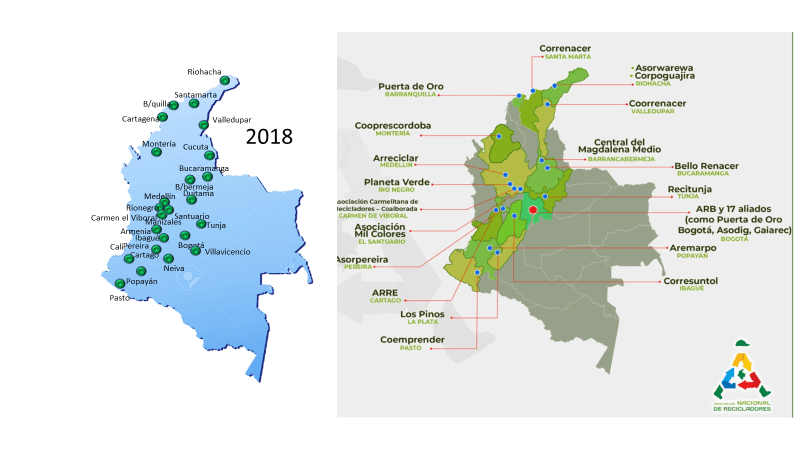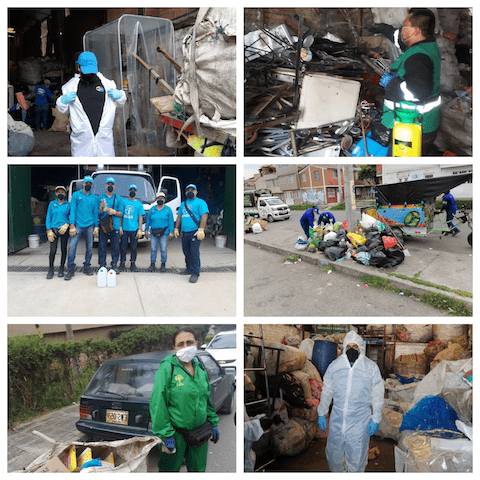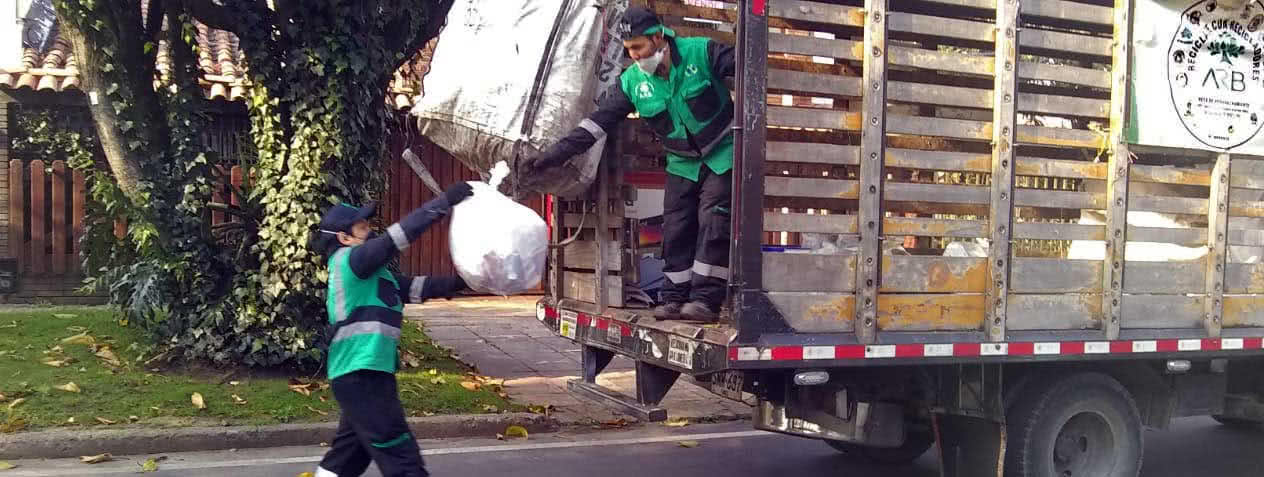Recognition of waste pickers’ essential role in waste management services was the strategic goal that the National Association of Waste Pickers (ANR, by its Spanish acronym) set for itself in the 1990s. Such recognition would allow waste pickers to defend their right to remain in the trade, to have certainty over access to recyclable materials, and to grow in the recycling value chain. In a webinar from WIEGO’s Workers´ Voices series, Nohra Padilla—leader of the Waste Pickers Association of Bogotá (ARB, by its acronym in Spanish) and ANR—shares with other workers the key milestones of the fight that won the waste pickers recognition as recycling public service providers. In this conversation with Federico Parra —WIEGO´s Regional Coordinator -Waste Pickers, Latin America— Nohra also speaks about the advocacy efforts to defend their role as public service providers and the challenges facing waste pickers in Colombia during the COVID-19 pandemic.
Recognition as Public Service Providers

In a struggle spanning more than three decades, waste pickers at the helm of ARB achieved the unimaginable. Through alliance-building, demonstrations and the repeated use of legal resources (such as writs of protections and claims of contempt of court), the Constitutional Court in 2011 ratified waste pickers´ environmental role, their work as public service providers, and their need to benefit from special State protection. Order 275 also stipulated waste pickers´ recognition and payment within the recycling service—a new component within waste management that was to operate in parallel with the collection of household waste.
“We were not demanding to be remunerated. However, in its interpretation of the protection of our rights the Court deemed that it had to go beyond [our demands]” —Nohra Padilla.
To ensure compliance, the Constitutional Court ordered the national government to regulate the functioning and remuneration of this service at the national level. This opened up the possibility for waste pickers´ organizations in the whole of Colombia to be recognized as recycling public service providers—not just those in Bogotá. But it was not until 2016, at the insistence of the Constitutional Court, that the government issued National Decree 596 in which the functioning of the recycling service became institutionalized.
The payment for the service was based on the quantity of recyclable materials that were collected, transported and effectively commercialized (with an invoice as proof) to be reused. This payment was to be equal to the payment for household waste management service—from the collection up to burial in the sanitary landfill.
Despite the shortcomings of the decree and the calculation of the payment, the recognition as public service providers has been a remarkable feat for waste pickers´ organizations. This achievement, however, continues to face multiple threats—most recently from the COVID-19 pandemic.
The Designation as Essential Workers During the Pandemic

The days following the confirmation of the first COVID-19 cases in Colombia, were rather uncertain for waste pickers´ organizations that had been providing recycling public services in the country since 2016. The government was developing measures to prevent the spread of the disease, while also defining the essential services that would enable the population to remain at home. If recycling were to be left out, waste pickers organizations ran the risk of being displaced by waste management companies and losing the recognition and payment they had fought so hard to obtain.
The first goal was clear: they had to ensure that recycling was designated as an essential service and that waste pickers´ organizations would receive the needed accreditation to provide this service during the pandemic. After strong advocacy work on the part of ANR together with allies before national government entities and the National Alliance for Recycling—a forum gathering all stakeholder in recycling—the designation was awarded to the waste pickers (National Decree 457 of 2020). But that was only the beginning.
To continue to work, waste pickers´ organizations had to overcome other challenges. Aside from gloves and masks, waste pickers must wear fluid-resistant uniforms to reduce the risk of contagion. Strict protocols and health and safety measures include disinfection at collection and sorting centres; the use of sprinkling booths with a solution of alcohol and rue (a plant also known by its scientific name, ruta graveolen); and working with sorting schedules that allow for the isolation of collected materials for 14 days.ANR is helping other waste pickers´ organizations to develop their protocols and monitoring procedures in all of their processes.
Waste pickers organizations are also facing challenges caused by disruptions in the recycling chain, due to lockdown restrictions. For this reason, ANR has advocated for some producers who reuse their recyclable materials, to be designated as essential as well—for example, producers of packaging for medicines.
While waste pickers organizations have continued to work, they have, nonetheless, been hit. The amount of money they receive for their recycling services financed through the waste management utility fee has gone down, as has the sale of recyclable materials. And the crisis is far from being over.
“The next stage of the crisis will be even worse” —Nohra Padilla
The organizations are bracing themselves for a new lockdown period and its implications on people´s mobility, consumption, and operational requirements, which will directly affect their incomes. The situation will be even more dire for those waste pickers that do not comply with the requirements to provide recycling services, such as nascent waste pickers organizations and waste pickers that are not organized.
Waste pickers´ organizations are conscious that they need to further strengthen their organizations and their productive processes, so that they can continue to provide recycling services and retain their livelihoods without compromising their health. To ensure waste pickers’ well-being, it is crucial that citizens learn to properly sort their waste to prevent additional risks. It is also urgent that municipalities assume their responsibilities to promote and accompany waste pickers´ organizing processes and that they put in place affirmative actions as mandated by Constitutional Court orders, to help them consolidate the provision of recycling as a public service.
Feature Photo Credit: ARB
